√1000以上 have to vs must exercises pdf 195477
How to Use Must, Have to, and Need to in English "Must," "have to," and "need to" in the positive or question form are used to speak about responsibilities, obligations and important actions I'm having some trouble understanding this I must ask Peter a few questions She has to work with clients from all over the world1 If you want to work in the USA you mustn't have to shouldn't I don't know speak good English 2 You must have to shouldn't I don't know give someone a clock as a present 3You stop making that unpleasant noise (A father to his son) 5) If you want to watch TV, first you finish your homework 6) If I want to buy a new house I get a mortgage (A

Read Online Mcgraw Hill Education 400 Must Have Words For The Toefl 2nd Edition Full Books
Have to vs must exercises pdf
Have to vs must exercises pdf-Don't have to = Mustn't Mustn't=it is prohibited, you cannot do itShould or Must A modal is an auxiliary (helping) verb that expresses ability, possibility, permission or necessity English modals include must, shall, will, should, can, could, would, may and might In this lesson, we shall be discussing SHOULD and MUST SHOULD and MUST express necessity



Cambridge English Grammar In Use Intermediate Supplementary Exercises 3rd Ed 04 Calameo Downloader
Must and have to modal verbs exercises Auxiliary verbs in English elementary, intermediate and adavanced level esl Index of contents Can / could exercises May / might Must / have to Shall / should Will / would Mixed modals exercises Had better Home Worksheets I have to hand in reports every week I must buy some mangoes "have to" and "must" both express obligations, but there's a subtle differenceThere is a small difference between the meaning of "have to" and "must" and it is a different type of obligation "have to" expresses objective obligation and "must" expresses subjective obligation Have to and must are being looked at together because of the interchangeability when used for certain functions and the confusion caused when they cannot be interchanged for others Have to 'Have to' is used to express certainty, necessity, and obligation This has to be the right place We are not lost
Modals exercise It´s an easy OE for students to practise the use of the modals CAN, CAN´T, MUST and MUSTN´T There are four activities with different levels of difficulty and a short grammar explanation I hope you find it usefulI must go to the doctor I must get up early tomorrow You mustn't call me before 8 It is used to describe something that the speaker thinks is necessary to do You must eat less candy I must try to do more exercise We can also use must to express strong advice You must see the new film;Must/mustn't, have to/don't have to – form Download fullsize image from must/mustn't Use must infinitive without to Must is a modal verb, and modal verbs are followed by an infinitive without to I must go to the doctor (NOT I must to go to the doctor;
ID 9193 Language English School subject English language Grade/level GRADE 10 Age 1314 Main content Must vs have to mustn't vs needn't and don't have to Other contents Add to my workbooks (418) Download file pdf Add to Google Classroom Add to Microsoft TeamsMust or should Must exercises 01 Must should mustn't shouldn't rules 02 must exercises English exercises 03 must word order examples 04 must exercises exercisesmust 05 must modal verbsexamples Should exercises 06 should modal verbs exercise 07 should modal auxiliaries word order 08 should modal auxiliaries word order 09 should modal auxiliaries word order 10Modals with "Not" 2 Must not, Do not have to For each space, decide whether "don't have to" or "mustn't" is best, then type in the correct form Type all of your answers and then click on "Check answers" Making an Omelette Making an omelette is easy You be a great chef to do it Here are some basic instructions




Must Or Have To Worksheet




Must Mustn T Can Have Don T Have To English Esl Worksheets For Distance Learning And Physical Classrooms
Modal verbs worksheets, printable exercises pdf, handouts to print Auxiliary verbs esl Index of contents Can / could exercises May / might Must / have to Shall / should Will / would Mixed modals exercises Had better Home Worksheets handouts Video modal verbs Can / could~ Yes, I must 2 We use have to to talk about an action that is necessary because of rules or laws,Main content Must or mustn't Other contents Classroom rules, modal verbs Add to my workbooks (2454) Download file pdf Embed in my website or blog Add to Google Classroom Add to Microsoft Teams Share through Whatsapp
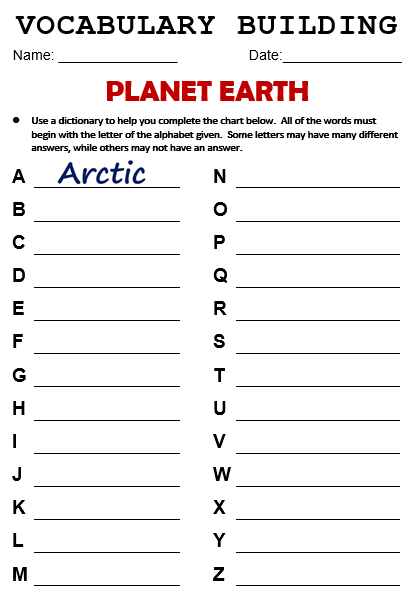



Planet Earth All Things Topics




Can Must Should English Esl Worksheets For Distance Learning And Physical Classrooms
MUST and MUSTN'T (necessity) Must Mustn't (Must not) Use must when you mean 'have to' do something – and it is very important to do it Examples (1) "I must study for the test" (2) "You must wear a seatbelt" Use mustn't when you mean that it is important NOT to do something Examples (1) "You mustn't forget about the1) You speak to your brother and try to solve that problem 2) You come with us to the cinema;Grammar videos Have to, must and should for obligation and advice – exercises Watch the video on our website and read the conversation between Sophie and Yu Quan Then do these exercises to check your understanding of must, have to and should
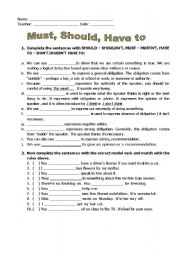



Must Should Or Have To Esl Worksheet By Baby V
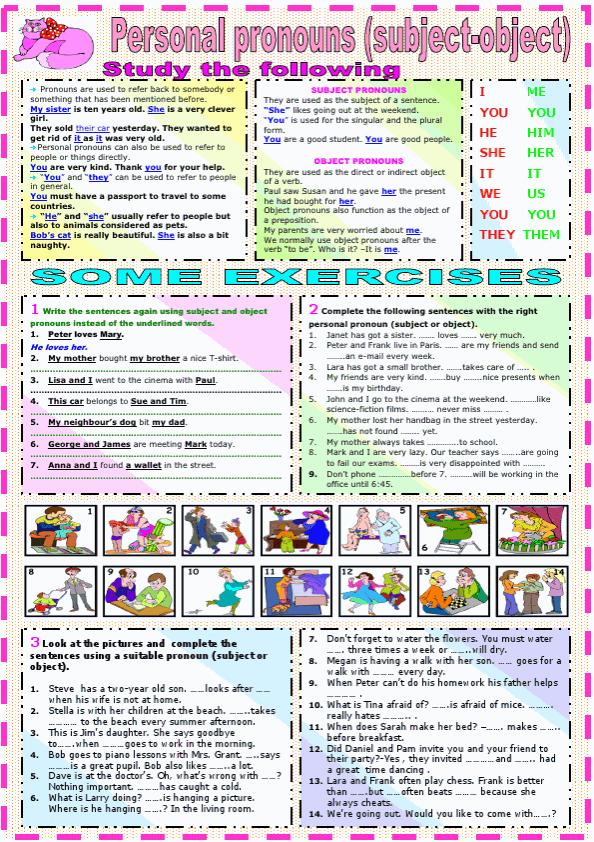



Personal Pronouns Subject And Object Grammar And Exercises Pdf Worksheets Engworksheets
The film we are going to see is marvellous 3) You are very fat You practice sport (consejo) 4) Please, we are in the church;Ought to (Should) Have / Must Have Needn't Have / Didn't Have To Should Have Done Drag and Drop Exercises Modals Drag and Drop 1 / 2 / 3 Other Drag & Drop Grammar Exercises Multiple Choice Exercises Modal Verbs Tests PDF Worksheets 1 / 2 / 3Topic Basic Modals Exercise 1 For each sentence, choose the modal (should, can, must) that is most appropriate NB In American English, "must" often sounds oldfashioned and/or bossy it's more natural in most cases to say "have to" as in "You have to be at the airport at 9" not "You must be at the airport at 9" 1



Fadeibuoni Files Wordpress Com




Modal Verbs Must Should Have To Worksheet Artofit
Must or Have to It´s a worksheet with a short grammar explanation on the use of MUST, MUSTN´T, HAVE TO and DON´T HAVE TO and some activities to practise ID Language English School subject English as a SecondThe main differences between must and have to are Must means "really should or else it will be bad for you", it expresses an obligation forced by the speaker Have / Has to expresses general obligations When we are talking about another person's obligation we use have to, too We use have to when the obligation comes from outsideBy 1mada An exercise to practise MUST and MUSTN´T Students have to complete the sentences with the affirmative or negative form B&W version and 28,759 Downloads Modal verbs quiz By 1mada A multiple choice exercise to practise modals for obligation, permission, prohibition, deduction, certainty
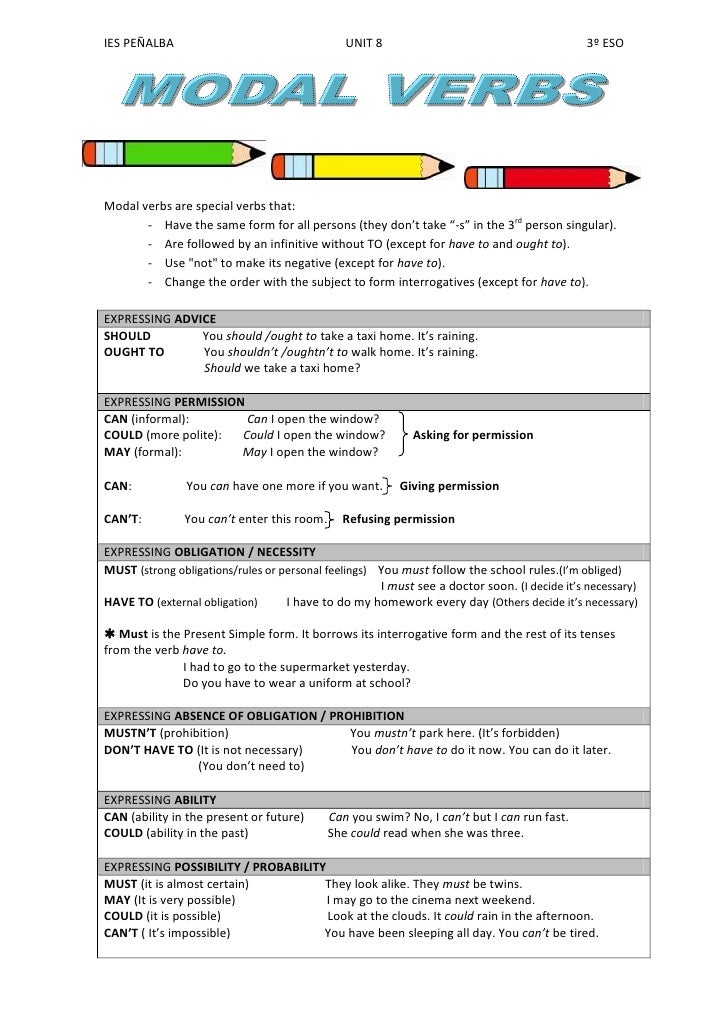



3º Eso Modal Verbs
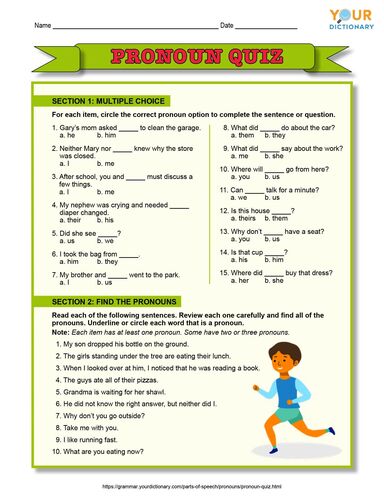



Pronoun Quiz Practice Questions With Answers
Should / must 1) Should should is used to give advice ,to make recommendations or to talk about what we think is right or wrong positive form ;Should Must Quiz Time limit 0 QuizsummaryPAGE 94 • MODAL VERBS 43 Must/have to, mustn't/don't have to 1 We use must when the speaker thinks it is necessary or important to do an action You must go (= It is important that you go) We make negatives, questions and short answers like this You mustn't go Must you go?




Must Mustn T Have To Don T Have To Worksheet
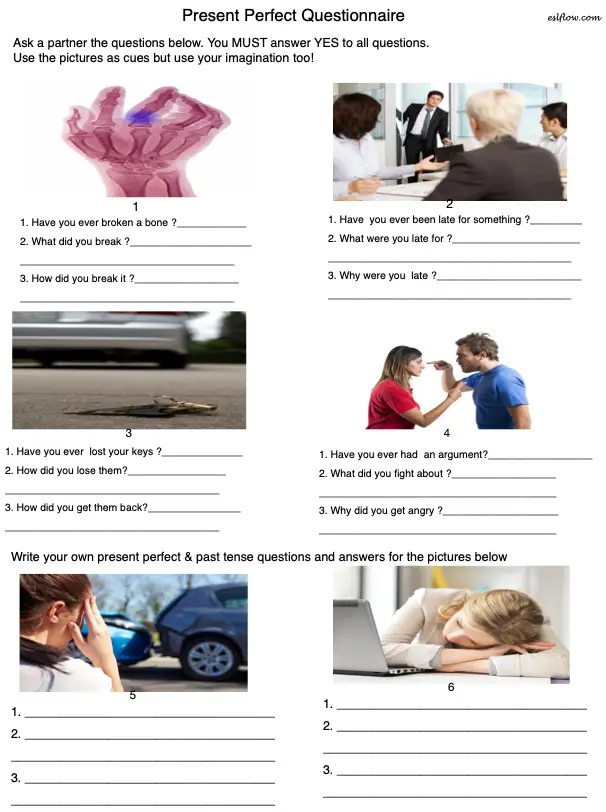



6 Present Perfect Grammar Speaking And Listening Exercises
No s Modal verbs don't add s after he/she/it He must come with us (NOT He must comes with usShouldeg You should eat more slowly ( Tu devrais manger moins rapidement ) negative form shouldn'teg YouWe use have to / must / should infinitive to talk about obligation, things that are necessary to do, or to give advice about things that are a good idea to do Mus t and have to are both used for obligation and are often quite similar They are both followed by the infinitive I must go now / I have to go now
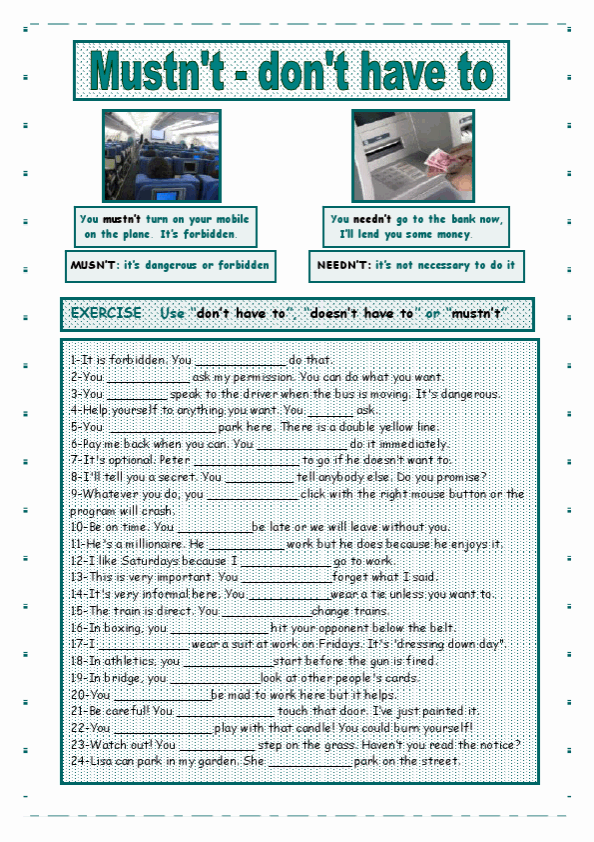



Must Have To Exercises Free Printable Must Have To Esl Worksheets Engworksheets




Active And Passive Voice Exercises For Class 8 Cbse With Answers English Grammar Cbse Tuts
2 pages/ Short grammar review writing exercises with should, mustgiving advice matching pictures and homework 28,865 Downloads Must or Mustn't By 1mada An exercise to practise MUST and MUSTN´T Students have to complete the sentences with the affirmative or negative form B&W version and An overview of the modal verbs should, must and have to which explains what rules you must follow when using these verbs, with examples and exercises to help you learn This online lesson is designed for intermediate level studentsMust have to I don't know wear a tie if you want to go to that restaurant It's one of their rules !



English Worksheets Must Worksheets Page 11
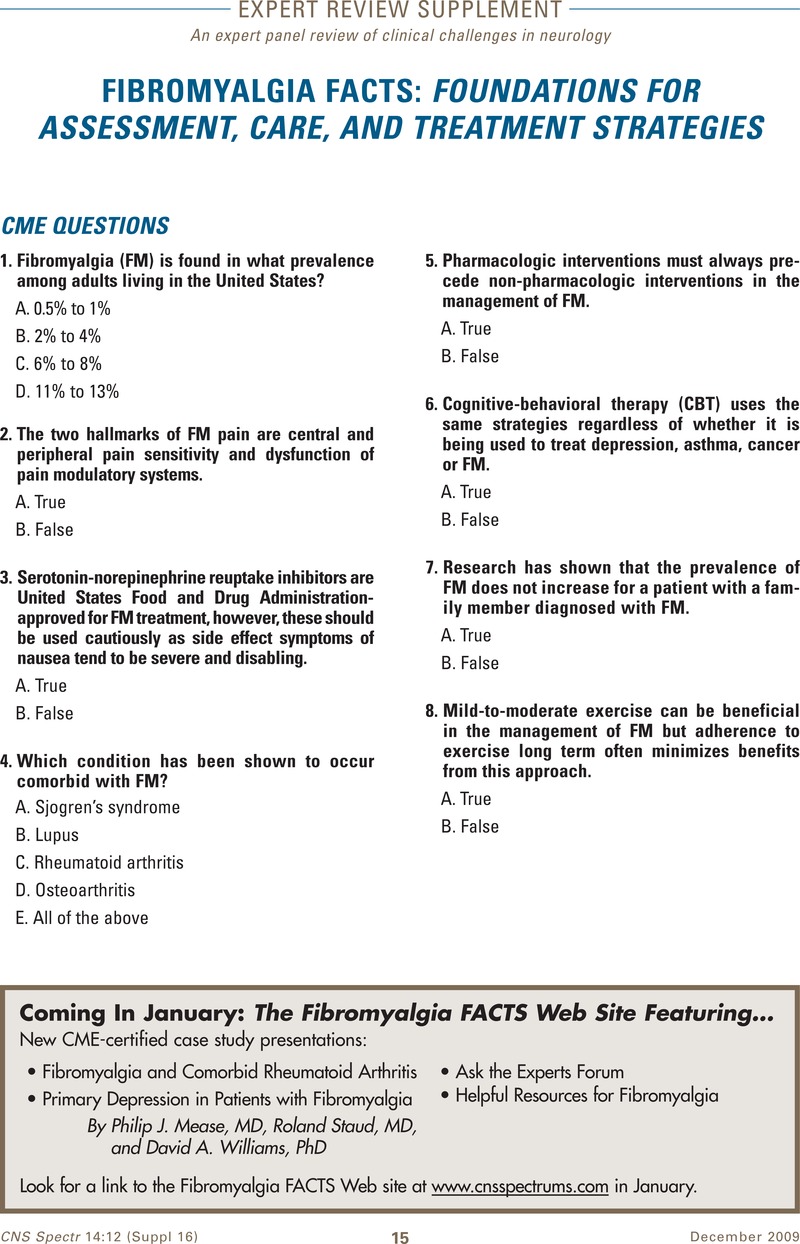



Cme Questions Cns Spectrums Cambridge Core
Free English Course Should vs Must Test This should vs must test your understanding of the difference between advice and obligation Do you know when to use each modal?2 pages/ Short grammar review writing exercises with should, mustgiving advice matching pictures and homework 28,799 Downloads Must or Mustn't By 1mada An exercise to practise MUST and MUSTN´T Students have to complete the sentences with the affirmative or negative form B&W version andMultiple Choice Exercises Modal Verbs Tests PDF Worksheets 1 / 2 / 3 Also See Must & Have To / Has To Complete the sentences with must or have to / has to 1 Everybody has to must




Auxiliary Verbs Must Or Mustn T Esl Exercise Worksheet For Kids Pdf Worksheets Engworksheets




Must Must Not Exercise 4 Pdf Must Mustn T Exercise 4 Www E Grammar Org Must Must Not Exercise 4 Use Must Or Mustn T To Respond To The Situations Course Hero
Can vs Could Exercise 4 Can Can't Exercises 567 Mustn't vs Don't Have to Exercises 1 / 2 / 3 10 Must vs Have to / Has to Exercises 1 / 2 / 3 11 Must / Mustn't / Needn't / Have to 1213 Modals With Passive Voice 1 / 2 14 Mustn't vs Needn't vs Can't Similar Exercises MODALS V3 Practice Test Ought to (Should) Have / Must Have Needn't3 You don't have to finish the exercise now You can finish it at home 4 James doesn't have to go to church if he doesn't want to 5 You mustn't drive so aggressively You'll end up killing someone 6 Helen mustn't make racist comments It makes her seem really ignorantHave to, must Have to is NOT an auxiliary verb (it uses the verb have as a main verb) We include have to here for convenience Must is a modal auxiliary verb In this lesson we look at have to, must and must not, followed by a quiz to check your understanding have to



Copy Of Must Vs Have To Lessons Blendspace
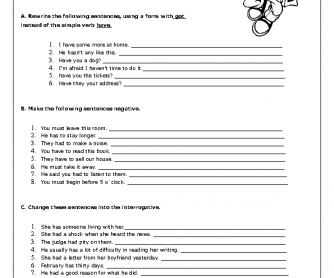



Must Mustn T Vs Have To Don T Have To Worksheet
You can find out below Good luck!2 I have to must I don't know go away on business, my boss wants me to visit our firm in Japan 3 Don't be silly, youCan vs Could Exercise 4 Can Can't Exercises 567 Mustn't vs Don't Have to Exercises 1 / 2 / 3 10 Must vs Have to / Has to Exercises 1 / 2 / 3 11 Must / Mustn't / Needn't / Have to 1213 Modals With Passive Voice 1 / 2 14 Mustn't vs Needn't vs Can't Similar Exercises MODALS V3 Practice Test Ought to (Should) Have / Must Have Needn't
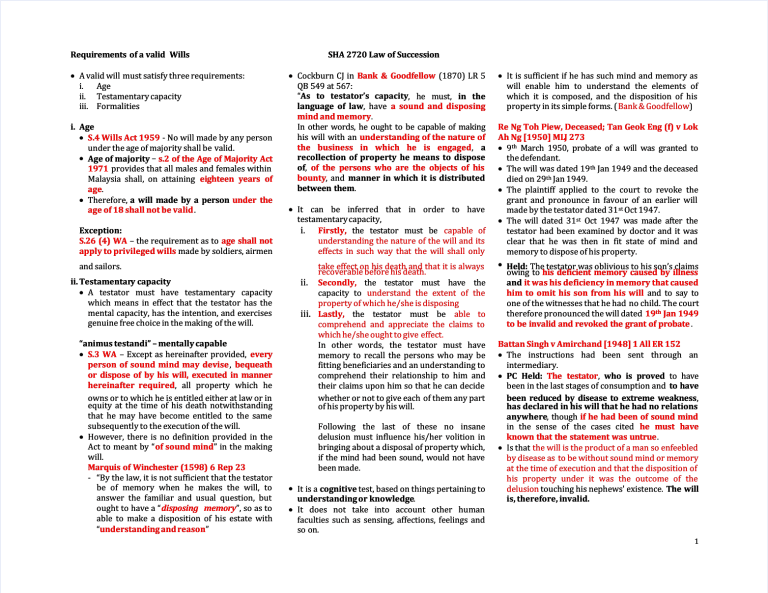



Pdf Sha 27 Requirements Of A Valid Willsdocx Compress



Elt One Webs Com
Must Have to Must and have to both express obligation However, they are used differently depending on who imposes the obligation MUST The speaker thinks it is necessary HAVE TO Someone else thinks it is necessary • I must buy flowers for my mother (It's her birthday and I decide to do that) • "You must take more exercise" says the doctorHave to, must Quiz You can do this grammar quiz online or print it on paper It tests what you learned on the have to, must page 1 Yesterday I _____ finish my geography project must mustn't had to a) must b) mustn't c) had to 2 She will _____ wait in line like everyone else mustHave to / Don't have to exercises Have to = it is important or mandatory to do something Don't have to = it is your choice, you can do it or not Example I have to go to work now Today it is Saturday, so you don't have to wake up early Warning!!




How To Teach May Might Could Must Off2class




Must And Have To Exercises
ID Language English School subject English as a Second Language (ESL) Grade/level PreIntermediate Age 1015 Main content Must or have to Other contents Add to my workbooks (21) Download file pdf Add to Google Classroom Add to Microsoft TeamsMust or have to worksheets and online exercises Language English Subject English as a Second Language (ESL) Order results Most popular first Newest first Have to vs Must Grade/level English IV by AreliGutierrez Must or Have to Grade/level Intermediate> Other English exercises on the same topic Modals Change theme > Similar tests Modal may/might Placement test 1 Modal can (video) Modal verb must / have to Modal can/could Must / Have to Modal verbs Modal verbs > Doubleclick on words you don't understand




Must Or Mustn T Interactive And Downloadable Worksheet You Can Do The Exercises Online Or Download The Verb Worksheets Worksheets For Kids Grammar Worksheets




Must Mustn T Needn T Exercises Pdf Exercise Poster
While questions with "must" are grammatically correct, it is more usual nowadays to use "have to" for questions There is no past form of must for obligation We had to show our passports at the border We weren't allowed to use calculators in the exam Or, we couldn't use calculators in Have To, Don't Have To, Needn't, Must or Mustn't Test A1 Level Exercises 16 Multiple Choice Questions With Answers Have To, Don't Have To, Needn't, Must or Mustn't Test A1 Level ExercisesMust vs have to Both Must and have to express obligation or necessity, but there are some small differences • Must expresses the speaker's feelings, whereas have to expresses, above all, an impersonal idea You must come You are obliged to come (I require that you come) You have to come You are obliged to come
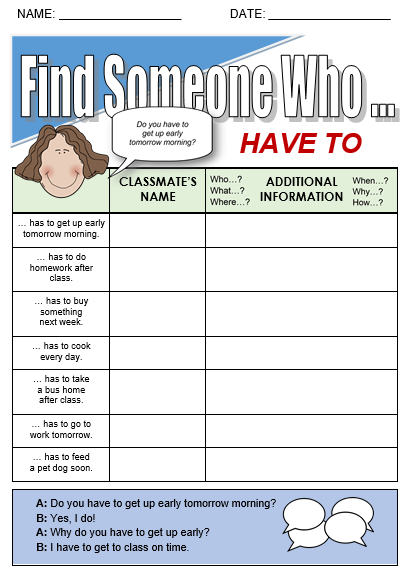



Have To All Things Grammar




Must Mustn T Exercises With Answers Pdf Improve Your Grammar Skill Easy English Lesson Youtube




Modal Verbs Interactive Worksheet For Pre B1
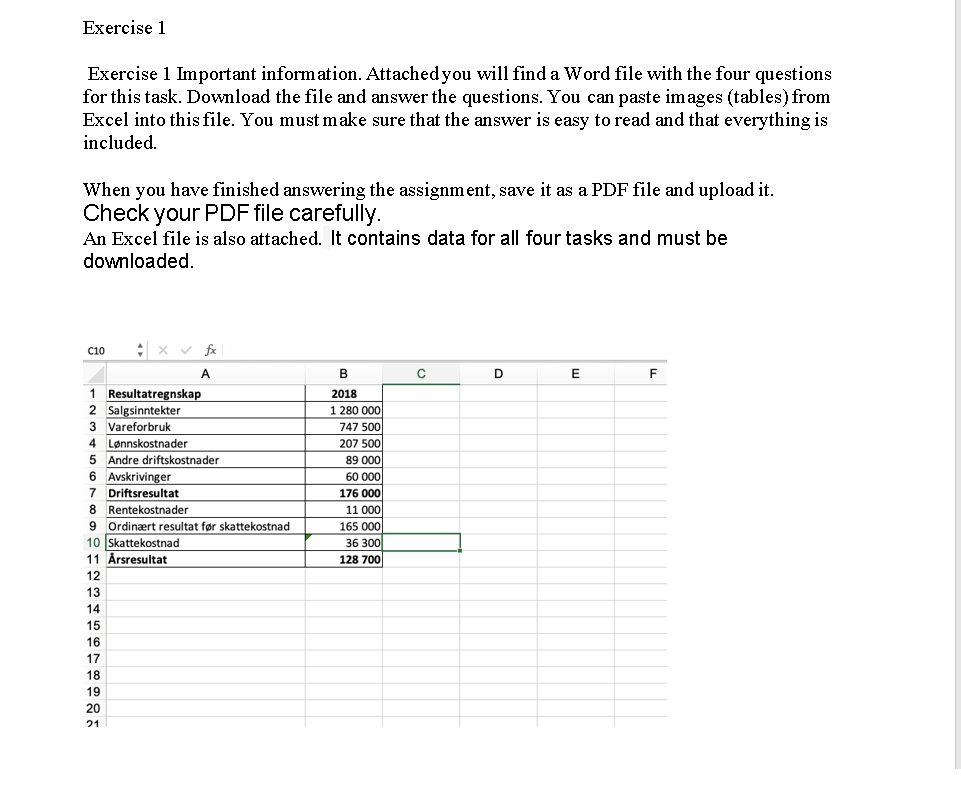



Exercise 1 Exercise 1 Important Information Attached Chegg Com




Key Word Transformation Exercises Pdfcoffee Com




Must Or Have To Worksheet
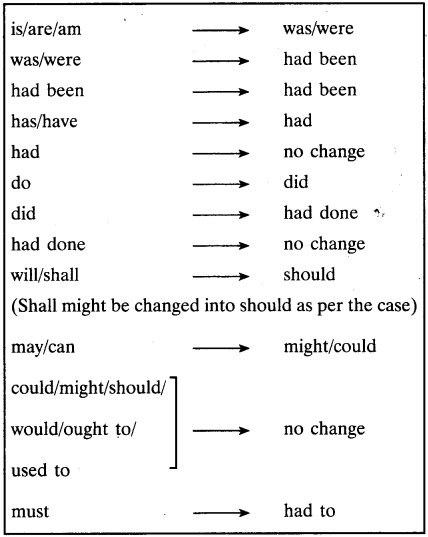



Reported Speech Exercises For Class 9 Cbse With Answers



Fadeibuoni Files Wordpress Com




Modal Verbs List Examples Pdf
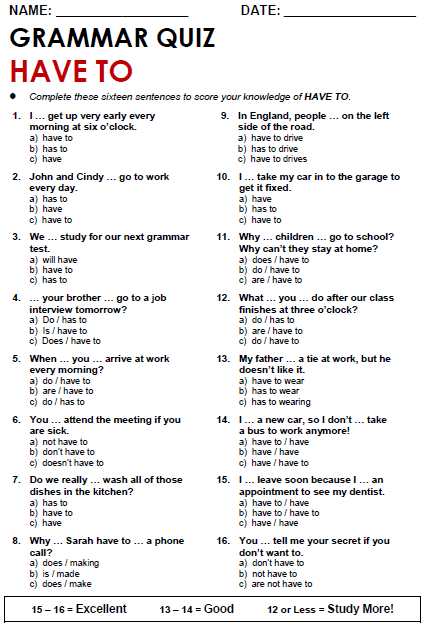



Have To All Things Grammar




Must Mustn T Can Have Don T Have To English Esl Worksheets For Distance Learning And Physical Classrooms



1



Cambridge English Grammar In Use Intermediate Supplementary Exercises 3rd Ed 04 Calameo Downloader



English Worksheets Modal Verbs Worksheets Page 46



Autoenglish Org




Harag Furat Bizzon Must Needn T Mustn T Geslab Net




Pin On Grammar
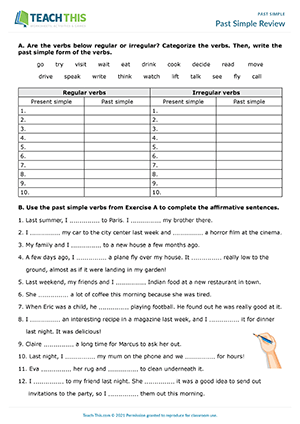



Past Simple Affirmative Negative Games Esl Activities Worksheets




Must Or Mustn T Interactive And Downloadable Worksheet You Can Do The Exercises Online Or Download The Wo Relative Pronouns Classroom Rules Pronoun Worksheets



Might Exercises Pdf
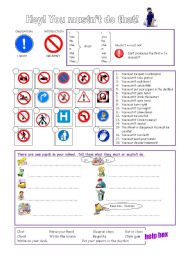



English Exercises Can Or Must




Pin On Technology



Fadeibuoni Files Wordpress Com
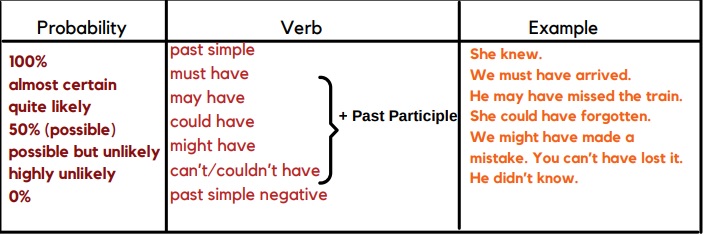



Past Modals Of Deduction Exercise And Explanation Pdf Free Esl Efl Worksheets With Answer Key Concordhomework




Solved Lab 2 Exercises Pdf 8 18 Tad X Sign Lab 2 Chegg Com




Must Have To Need To Exercises Pdf Exercisewalls
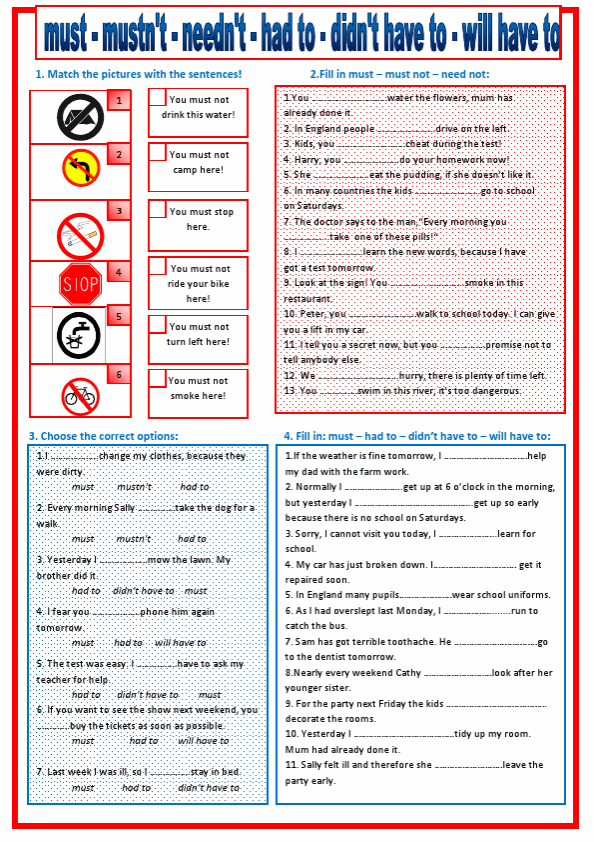



Must Have To Exercises Free Printable Must Have To Esl Worksheets Engworksheets




Must Mustn T Vs Have To Don T Have To Worksheet




Pdf Online Exercise Modals




Must Mustn T Worksheet Pdf
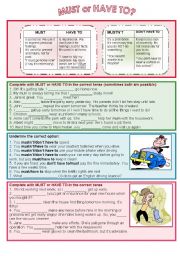



English Exercises Must Or Mustn T
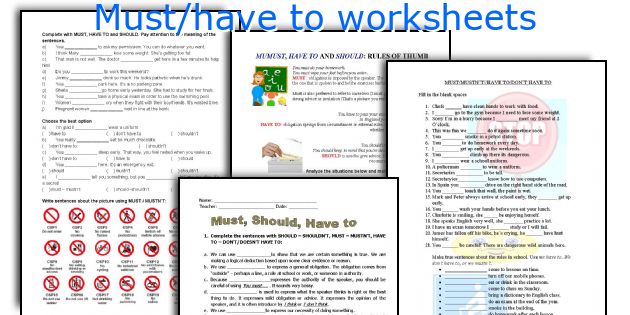



Must Have To Worksheets
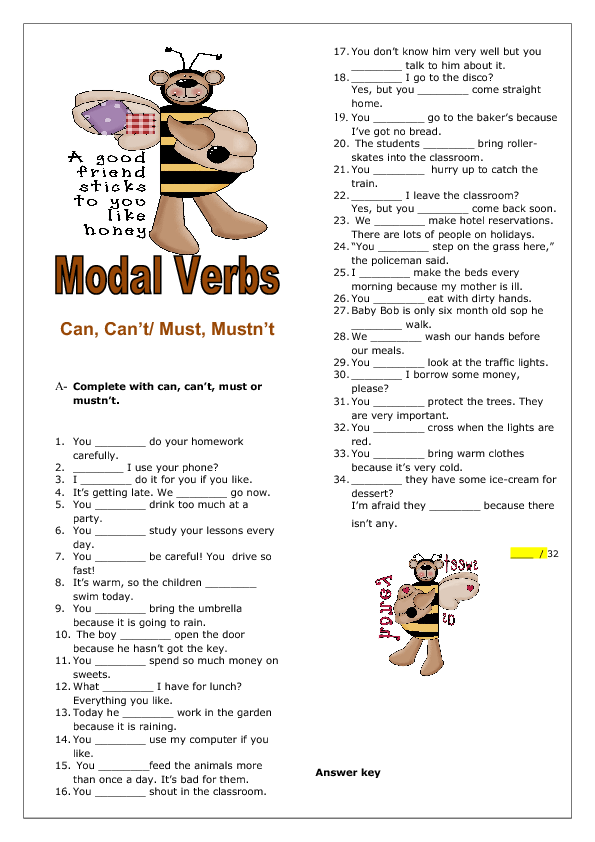



Can Can T Must Mustn T Elementary Worksheet
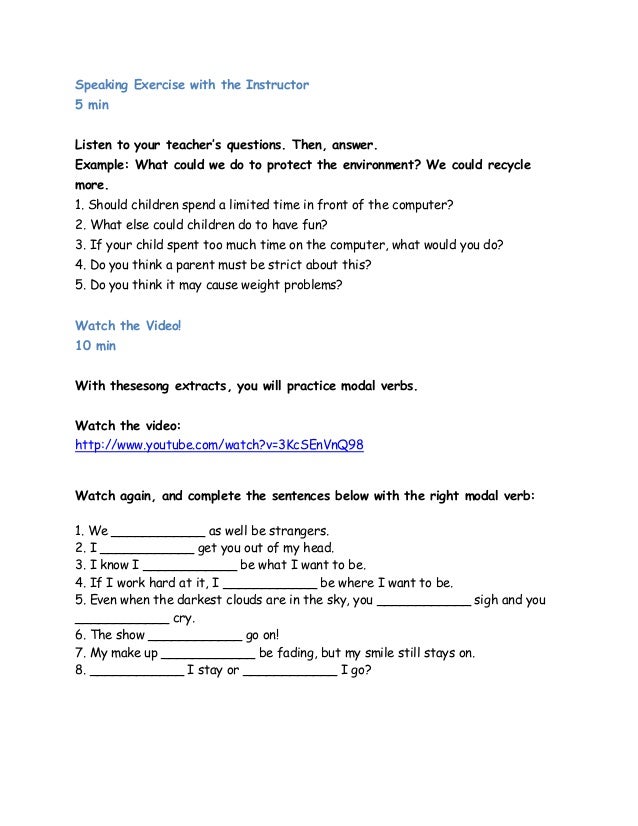



02 English Grammar Verbs 03 Modal Verbs Pdf



1
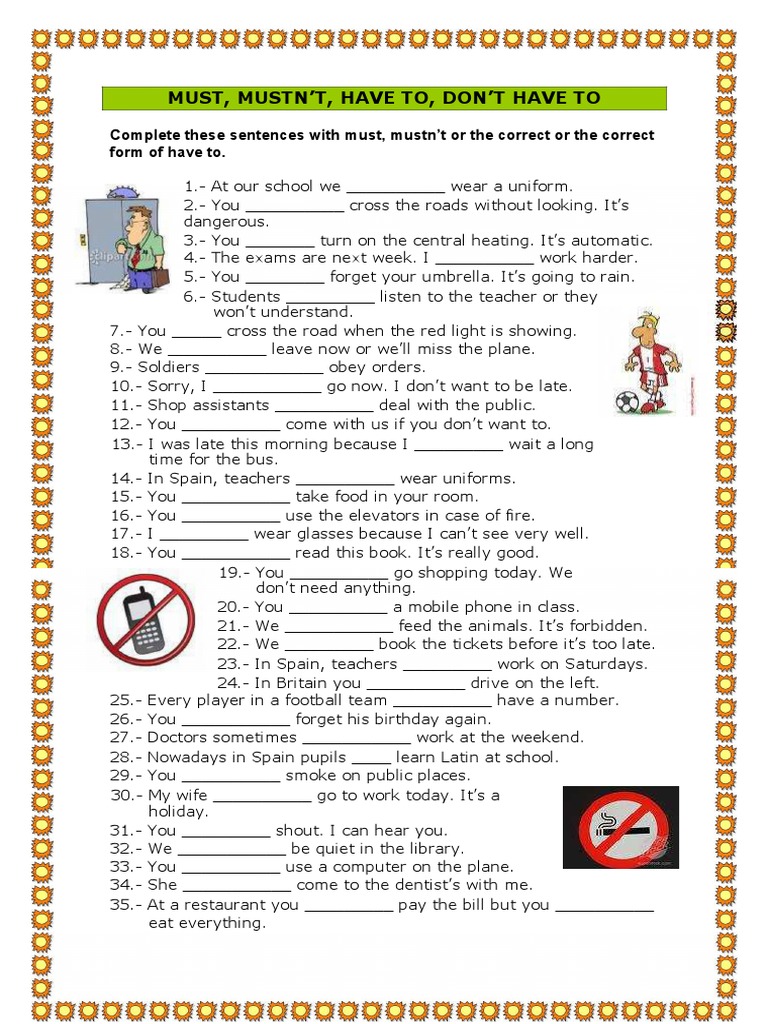



Must Pdf
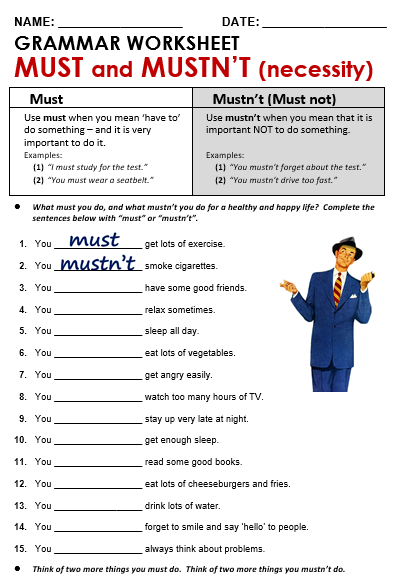



Must Necessity All Things Grammar




Calameo Ingles Pdf




Modal Exercises Pdf Document




Should Must And Have To English Esl Worksheets For Distance Learning And Physical Classrooms




How To Teach May Might Could Must Off2class
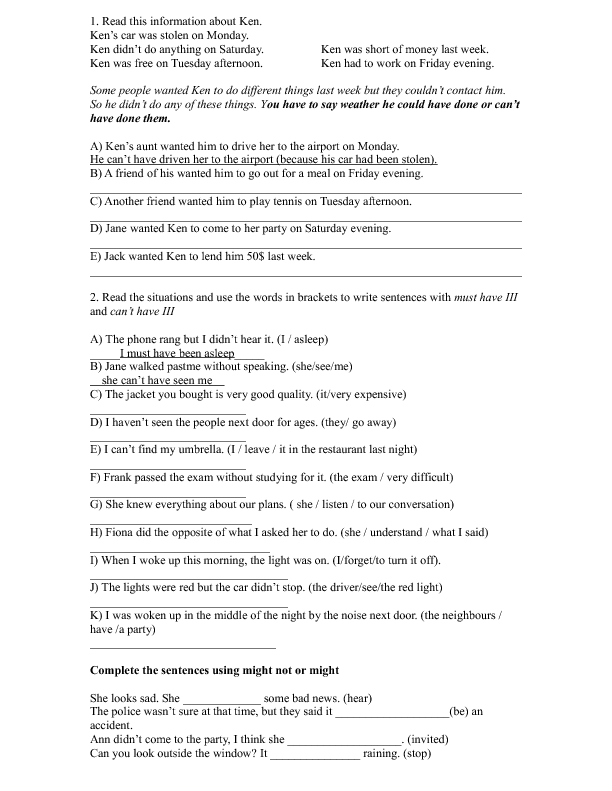



Modals Speculating About The Past




Read Online Mcgraw Hill Education 400 Must Have Words For The Toefl 2nd Edition Full Books




Pdf Key Word Transformation Exercises Ha Hồ Thị Academia Edu




Must Mustnt Have To Dont Have To Pdfcoffee Com




Ivilas Ivilas7187 Profile Pinterest
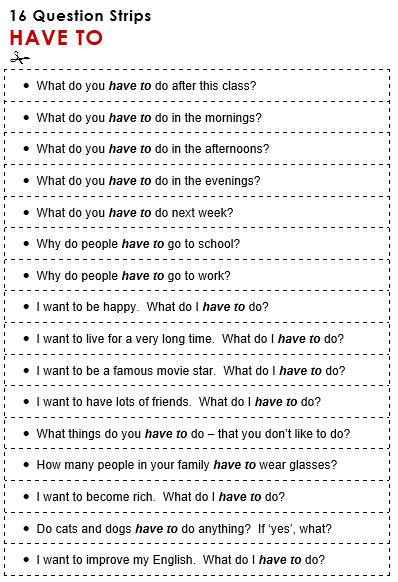



Have To All Things Grammar




Modal Verbs Of Deduction And Speculation In The Past Aba Journal
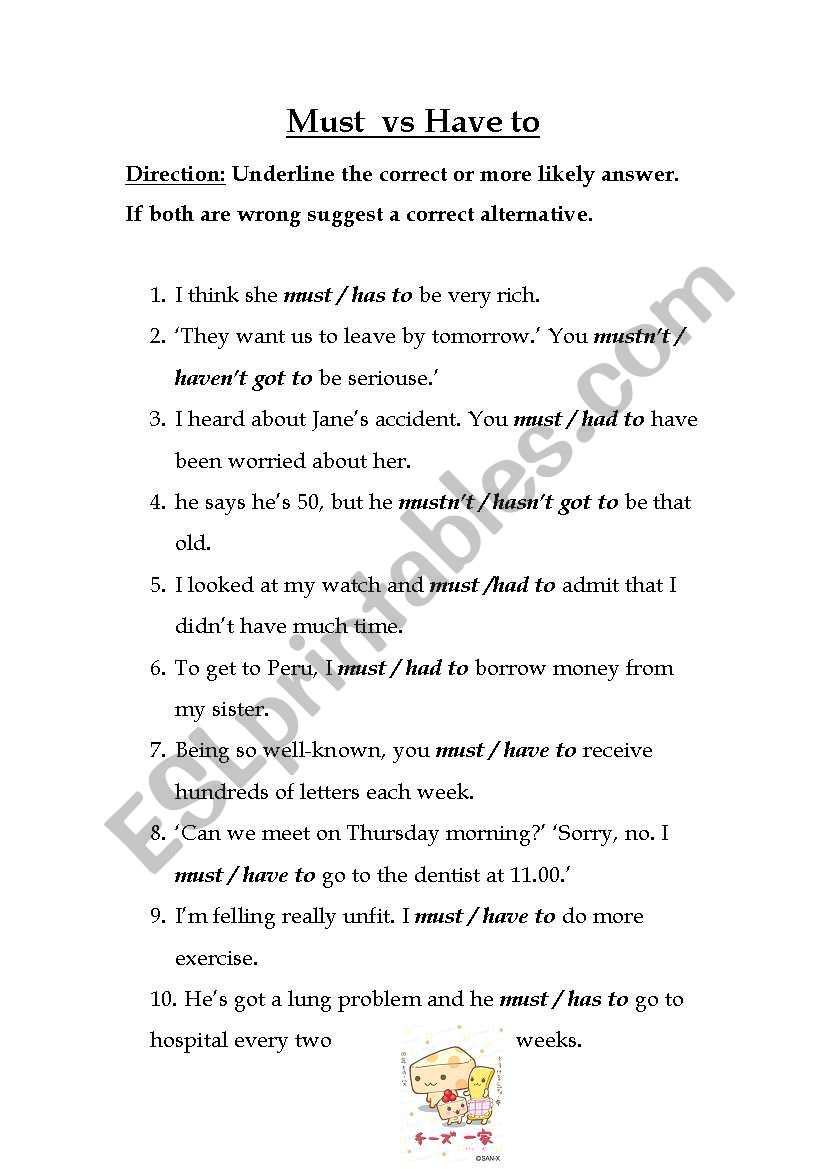



Exercise For Modals Must Vs Have To Esl Worksheet By Bambienoo




The Humanitarian Impact Of Israeli Settlements In Hebron City February 18 Occupied Palestinian Territory Reliefweb




Should Must




Must Have Vs Should Have




Worksheet Interrogatives Modal Versus Main Verbs Esl Abcteach




Test English Prepare For Your English Exam




English Grammar Pdf Documents Just Learn English Online Facebook




Upcoming Study Looks At Exercise For Transgender Males The North Wind




Have To Must Exercise Pdf




Modal Verbs Can May Must Worksheet Pdf Pdf Languages Language Arts Discipline




Must Have To Exercises
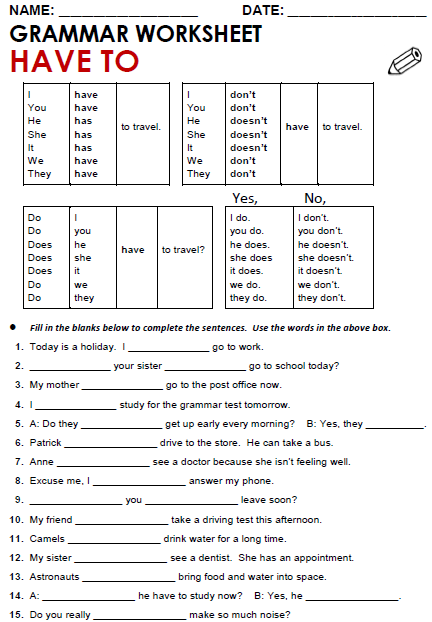



Have To All Things Grammar
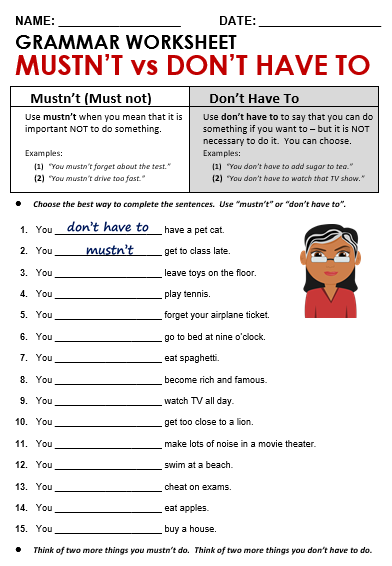



Can And Must Exercises




English Esl Must Or Have To Obligation Worksheets Most Downloaded 136 Results




Infinitives Of Purpose Combo Interactive Worksheets For Google Apps Teaching Resources



1




Must Mustn T Have To Don T Have To English Esl Worksheets For Distance Learning And Physical Classrooms



1




Sports And Exercise Interactive Worksheets For Google Apps Teaching Resources




English Grammar Pdf Documents Just Learn English Online Facebook




Must Vs Have To English Esl Worksheets For Distance Learning And Physical Classrooms




Rohingya Response The Coronavirus Covid19 Situation Is Stressful For Everyone And It Is Normal To Be Anxious And Worried To Help You Cope Take A Look At Who Guidance Here




Modal Verbs Must Mustn T Should Shouldn T Don T Have To Worksheet
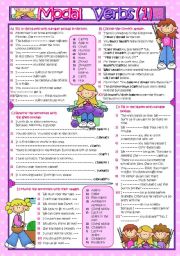



Modal Verbs Part 1 B W And Key Included Esl Worksheet By Lady Gargara




Modal Verbs Activity




Pdf Modal Verbs Should Can Could Must Neednt Yoko Tsuki Academia Edu
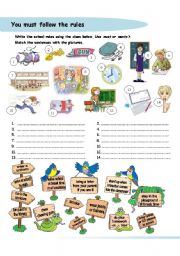



English Exercises Must Or Mustn T




Multibrief Simple Exercises To Improve Ell Reading Skills




Modal Verbs Busyteacher Free Printable Worksheets For Busy English Teachers
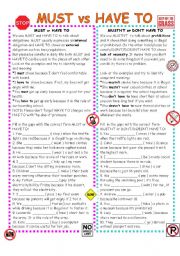



Must Or Have To Esl Worksheet By urcu
コメント
コメントを投稿